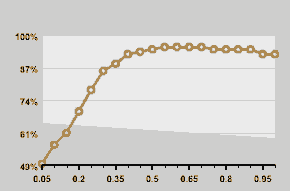Howdy I am hosehead, I am new to the forum and have enjoyed reading the posts over the last few months. I just turned 40 in March of 2012. I don’t have an age that I plan to retire at the moment but I would like to be able to retire by 50 at the latest. I am married and have two children aged 9 and 7. I currently live and work overseas which allows me to save an even larger portion of my income than I have been used to. I have been with this company almost two years and am blessed with a great 401k and defined benefit pension plan. Of course this blessing will also make it hard to leave when I am tired of it. Anyway here is my current status:
· $403k in my 401k’s (both at Vanguard)
· $44k pension (current cash value)
· Six rental homes (free and clear) with gross rents of $5,900 month, ~$4,000 net
· Rent my primary residence in Texas (so currently no housing costs)
· $66k 529 accounts
· $95k Cash
· $64k Muni-bonds
All the investments accounts contain bond and stable value funds. I have essentially no stock exposure because after analyzing my investment return from 1999 to 2012 it was so pathetic that I did not understand why I would want to go through more decades of turmoil like that. I did what they said, dollar cost averaging, stuck it out through the ups and downs, my entire 401k in low cost Vanguard funds, and still nowhere close to the “8%” I was supposed to get for being such a diligent investor. So in April 2011 I moved out of stocks after rebuilding the losses from the last recession. Yes I am cynical on the stock market and I can tell from other posts that might hurt my growth potential but I see nothing on the horizon that makes me think stocks will be a great thing for the next decade. Vanguard keeps reminding me that I am outside my target allocation but I have still done nothing.
The biggest wildcard for me is health care. I have a wife who is Type1 diabetic and both my children require maintenance drugs. I feel I could be ready to retire in just a few years if it wasn’t for that. If I can stick it out until I am 50 I would get great retiree coverage from the company but that is 10 years away. I value life much more than money but I cannot neglect my responsibility as a husband and father so health coverage really concerns me. I welcome all input and have really enjoyed reading the many individual experiences out here.
· $403k in my 401k’s (both at Vanguard)
· $44k pension (current cash value)
· Six rental homes (free and clear) with gross rents of $5,900 month, ~$4,000 net
· Rent my primary residence in Texas (so currently no housing costs)
· $66k 529 accounts
· $95k Cash
· $64k Muni-bonds
All the investments accounts contain bond and stable value funds. I have essentially no stock exposure because after analyzing my investment return from 1999 to 2012 it was so pathetic that I did not understand why I would want to go through more decades of turmoil like that. I did what they said, dollar cost averaging, stuck it out through the ups and downs, my entire 401k in low cost Vanguard funds, and still nowhere close to the “8%” I was supposed to get for being such a diligent investor. So in April 2011 I moved out of stocks after rebuilding the losses from the last recession. Yes I am cynical on the stock market and I can tell from other posts that might hurt my growth potential but I see nothing on the horizon that makes me think stocks will be a great thing for the next decade. Vanguard keeps reminding me that I am outside my target allocation but I have still done nothing.
The biggest wildcard for me is health care. I have a wife who is Type1 diabetic and both my children require maintenance drugs. I feel I could be ready to retire in just a few years if it wasn’t for that. If I can stick it out until I am 50 I would get great retiree coverage from the company but that is 10 years away. I value life much more than money but I cannot neglect my responsibility as a husband and father so health coverage really concerns me. I welcome all input and have really enjoyed reading the many individual experiences out here.

